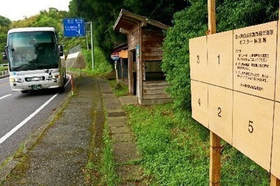 Source: http://headlines.yahoo.co.jp
Source: http://headlines.yahoo.co.jp In this state of affairs, any incumbents who happen to sit on town or village councils will presumably be re-elected by default, given there are no other candidates standing for election. The current mayor of Gokasechō, Ogasa Mayumi, says that they tried to get some young people and women to stand as candidates, yet were rebuffed with reasons such as not wanting to quit work or that it would be a burden on the family. Another reason highlighted in the article is that the remuneration for sitting on the town council is a mere 188,000 yen a month, which is well below the standard living wage and is the lowest such wage among all councils in the prefecture.
For those younger people living in rural areas, which in the case of Japan is something of a rare phenomenon, politics does not have much of a lure, for unlike city or even prefectural councils the decisions made at the local level are rarely influential and lack any of the ‘glamour’ associated with high-profile councils. Local council members often have to finance their own campaigns, which puts an additional burden on them when, in the case of younger town or village residents, they are still trying to establish their place in society and have other debts to consider.
Demographic squeeze is a problem that Japan has faced for over a decade, but the effects of that have mostly been confined to the welfare and education sectors. The steady regression in political participation in the regions has yet to be replicated in major urban centres, but it is only a matter of time before it does. When that happens, expect to see a whole lot more advertising from the traditional political parties trying to make up for lost time and depict politics as ‘cool’, but by then the ship will have well and truly sailed.
In a system dominated by access to party funding and generational politicians, the position of the independent representative will mostly depend on personal wealth and popularity, which is why politics will become a platform for entertainers and high-profile celebrities. This will serve to only emphasise the politics on urban areas and exacerbate the drop in political participation in rural areas. And this trend will continue unabated, for without an influx on new representatives local councils will stagnate and disappear, further marginalising the rural vote to the benefit of an entrenched and aging political class.
 RSS Feed
RSS Feed